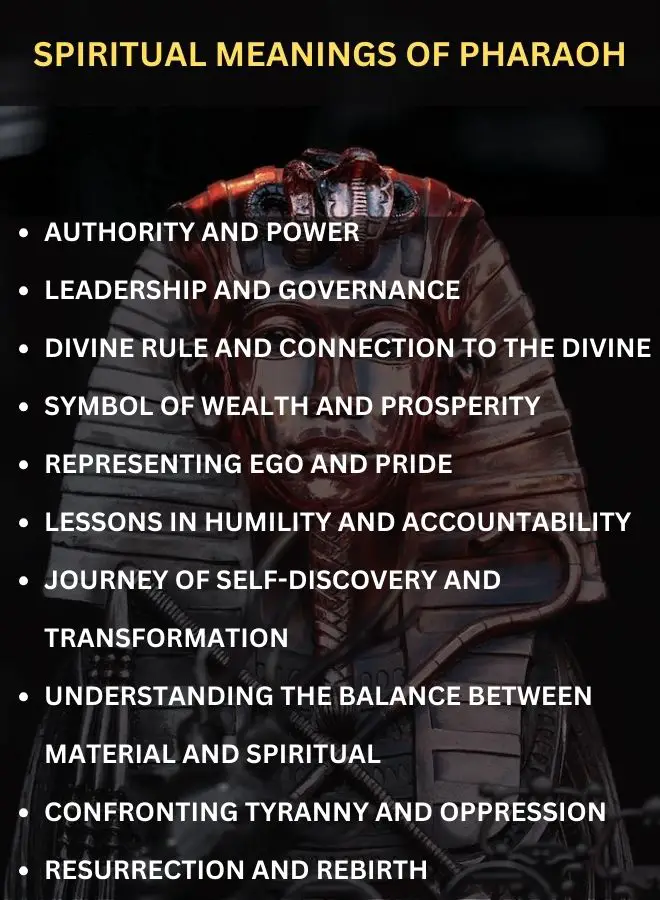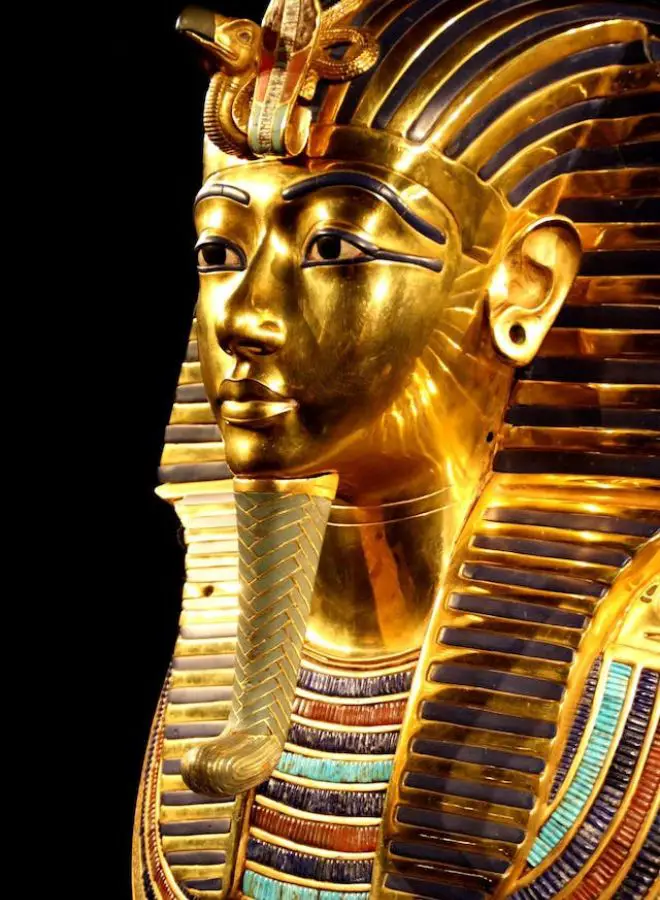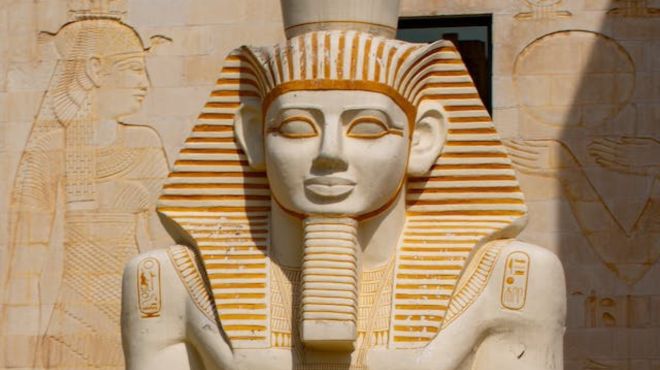The Pharaoh symbolizes authority, leadership, and divine connection. His story teaches humility, balance, and the pursuit of spiritual growth amidst worldly challenges.
In the annals of history, few figures command as much awe and intrigue as the Pharaohs of ancient Egypt. But beyond their majestic tombs and golden artifacts lies a deeper, more profound significance—the spiritual essence of the Pharaoh.
Join us on a journey as we delve into the enigmatic world of the Pharaohs and uncover the hidden meanings that resonate across cultures and centuries.
Spiritual Meanings of Pharaoh

1. Authority and Power
The Pharaoh represents the pinnacle of earthly authority, ruling over ancient Egypt with unquestioned power. Beyond mere governance, this symbol embodies the capacity within each individual to assert control over their lives and influence their surroundings.
It serves as a reminder of the inherent strength and sovereignty that lie within us all, urging us to embrace our personal power and take charge of our destinies.
2. Leadership and Governance
As the shepherd of his people, the Pharaoh symbolizes the essence of effective leadership and responsible governance. His reign is not just about wielding authority but about serving and guiding those under his care.
The Pharaoh’s legacy prompts us to reflect on our own roles as leaders in our communities, workplaces, and families, encouraging us to lead with integrity, compassion, and a sense of duty towards others.
3. Divine Rule and Connection to the Divine
In ancient Egypt, the Pharaoh was believed to be a divine figure, bridging the gap between mortal and immortal realms. This notion underscores the intrinsic connection between humanity and the divine, emphasizing our innate spiritual nature and the possibility of transcending earthly limitations to commune with higher powers.
The Pharaoh’s divine status serves as a beacon, inspiring us to seek a deeper understanding of our own spiritual identities and connections.
4. Symbol of Wealth and Prosperity
The opulence of the Pharaoh’s court evokes images of wealth and abundance, but beneath the glittering façade lies a deeper truth. True prosperity extends beyond material possessions to encompass spiritual richness, emotional well-being, and a sense of fulfillment derived from living in alignment with one’s values and purpose.
The Pharaoh’s legacy prompts us to redefine our notions of wealth and prosperity, recognizing that true abundance springs from within.
5. Representing Ego and Pride
The pharaoh’s downfall often stems from his unchecked ego and pride, serving as a cautionary tale against the dangers of arrogance and hubris. His story reminds us of the pitfalls of vanity and self-importance, urging us to cultivate humility and self-awareness in our own lives.
By humbling ourselves before the greater mysteries of existence, we open ourselves to growth, learning, and ultimately, true wisdom.
6. Lessons in Humility and Accountability
Despite his exalted status, the Pharaoh is not immune to the laws of nature and mortality. His eventual demise serves as a sobering reminder of the impermanence of earthly power and the inevitability of accountability for one’s actions.
The Pharaoh’s journey prompts us to reflect on our own mortality and the legacy we leave behind, encouraging us to live with integrity, authenticity, and a sense of responsibility towards future generations.
7. Journey of Self-Discovery and Transformation
The Pharaoh’s ascent to power mirrors our own quest for self-discovery and transformation. His trials and tribulations represent the challenges we face on our spiritual journey—confronting our inner demons, overcoming obstacles, and ultimately, emerging stronger and wiser.
The Pharaoh’s story inspires us to embark on our own odyssey of self-realization, embracing the inherent potential for growth and evolution within each of us.
8. Understanding the Balance Between Material and Spiritual
As both earthly ruler and divine intermediary, the Pharaoh embodies the delicate balance between material and spiritual pursuits. His example reminds us that true fulfillment lies not in the accumulation of wealth or power but in the cultivation of the soul.
By honoring both the material and spiritual aspects of our existence, we can achieve a sense of harmony, wholeness, and purpose in our lives.
9. Confronting Tyranny and Oppression
Throughout history, Pharaohs have been synonymous with tyranny and oppression, wielding their power to subjugate the masses. Their legacy serves as a stark reminder of the dangers of unchecked authority and the importance of standing up against injustice.
The Pharaoh’s story calls upon us to resist oppression in all its forms and to strive for a world where freedom, equality, and justice prevail.
10. Resurrection and Rebirth
In ancient Egyptian belief, the Pharaoh’s death was not the end but the beginning of a journey to the afterlife. This concept of resurrection and rebirth symbolizes the cyclical nature of existence and the eternal renewal of the soul.
The Pharaoh’s story offers hope in the face of mortality, reminding us that death is not an end but a transition—a doorway to new beginnings and endless possibilities.
Variations and Spiritual Meanings of Pharaoh
1. Ancient Egyptian Beliefs
In ancient Egypt, the Pharaoh held a divine status, believed to be a living deity on Earth. This concept of divine kingship emphasized the interconnectedness between mortals and gods, with the Pharaoh serving as a bridge between the earthly realm and the divine.
The ruler’s role extended beyond mere governance; they were entrusted with maintaining cosmic order and ensuring the prosperity of the land.
2. Mesopotamian Influence
Similar to ancient Egypt, Mesopotamian cultures also revered their rulers as divine intermediaries. Kings were seen as representatives of the gods, tasked with upholding divine law and justice.
The influence of Mesopotamian beliefs on the Pharaonic concept of kingship highlights the universal human tendency to perceive earthly rulers as divine or semi-divine figures with a sacred duty to govern justly.
3. Greek Interpretations
In Greek mythology, figures like Alexander the Great were likened to Pharaohs due to their aspirations for divine status and legendary conquests. This comparison underscores the timeless allure of the Pharaoh archetype, transcending cultural boundaries and resonating across different historical epochs.
The blending of mortal and divine attributes in Greek interpretations reflects humanity’s fascination with power, ambition, and the pursuit of immortality.
4. Symbolism in Modern Interpretations
In contemporary society, the Pharaoh symbolizes enduring principles of leadership and authority. The allure of power and prestige associated with the Pharaoh archetype continues to captivate the human psyche, manifesting in various forms of leadership—from political figures to corporate executives.
The Pharaoh’s legacy serves as a reminder of the complex interplay between power, responsibility, and the quest for immortality in the modern world.
5. Mystical Interpretations
Mystics and spiritual seekers are drawn to the mystique of the Pharaoh, viewing the ruler as a guide to higher states of consciousness. The Pharaoh’s journey through the underworld symbolizes the soul’s quest for transcendence and enlightenment, mirroring humanity’s eternal search for spiritual meaning and purpose.
The mystical interpretation of the Pharaoh archetype highlights the universal human longing for spiritual fulfillment and connection to the divine.
6. Psychological Perspectives
From a psychological standpoint, the Pharaoh represents the ego—the conscious mind’s need for control and validation. The Pharaoh’s eventual downfall serves as a cautionary tale about the limitations of ego-driven ambition and the transformative power of inner growth.
This psychological interpretation underscores the importance of humility, self-awareness, and emotional intelligence in navigating the complexities of leadership and personal development.
7. Symbol of Control
The Pharaoh embodies humanity’s enduring quest for power and control over the world. However, his eventual downfall serves as a poignant reminder of the transient nature of earthly dominance and the folly of unchecked pride.
The Pharaoh’s story challenges us to confront our own desires for control and recognition, reminding us of the importance of humility and perspective in the face of worldly success.
8. Cultural Perspectives
The image of the Pharaoh has left an indelible mark on global culture, inspiring awe and fascination across art, literature, and religion. From the monumental pyramids of Giza to the enduring myths of ancient Egypt, the Pharaoh’s legacy continues to captivate the human imagination, serving as a symbol of power, mystery, and enduring legacy.
9. Literary Interpretations
Writers and poets throughout history have been captivated by the mystique of the Pharaoh, weaving tales of power, ambition, and mortality. From Shakespeare’s Julius Caesar to Shelley’s Ozymandias, the Pharaoh’s reign has served as a timeless muse for generations of storytellers, exploring themes of hubris, downfall, and the transient nature of earthly glory.
10. Contemporary Relevance
In today’s fast-paced world, the lessons of the Pharaoh resonate more than ever. As we navigate the complexities of leadership and authority, the Pharaoh’s story reminds us to lead with integrity, humility, and compassion.
The timeless wisdom of the Pharaoh archetype transcends cultural and historical boundaries, offering valuable insights into the nature of power, responsibility, and the human condition.
Biblical and Hinduism Meanings of Pharaoh

Biblical References
In biblical narratives, Pharaoh symbolizes both oppressive authority and divine intervention. Through the plight of the Israelites, his tyranny showcases the struggle against injustice and the perseverance of faith.
The plagues of Exodus depict a cosmic battle between divine forces and human arrogance, culminating in the liberation of the oppressed. Pharaoh’s story serves as a testament to the enduring power of faith and the ultimate triumph of righteousness over tyranny.
Hinduism Connections
In Hindu mythology, figures like Ravana are often paralleled with Pharaohs due to their portrayal as proud and powerful rulers ultimately undone by their hubris. Their narratives serve as potent cautionary tales, highlighting the perilous consequences of unchecked ego and attachment.
By examining the downfall of such characters, Hindu mythology imparts valuable lessons on humility, self-awareness, and the importance of transcending personal desires for greater spiritual fulfillment and enlightenment.
Cultural Significances of Pharaoh
The legacy of the Pharaohs is deeply intertwined with Egyptian culture, leaving an indelible mark on the nation’s identity. The monumental structures they commissioned, such as the pyramids of Giza and the temples of Luxor, stand as enduring symbols of their power and influence.
These architectural marvels not only showcase the Pharaohs’ mastery of engineering and design but also serve as testaments to their religious beliefs and cultural values. Today, they continue to inspire awe and admiration, attracting visitors from around the world who marvel at the ingenuity and grandeur of ancient Egyptian civilization.
Improving Your Spiritual Life through Understanding Pharaoh
Reflection and Self-Examination: Exploring Personal Power Dynamics
By delving into the spiritual meaning of Pharaoh, we gain valuable insights into our own power dynamics and leadership styles. Are we ruling with wisdom and compassion, or are we succumbing to the pitfalls of ego and pride?
Cultivating Humility and Accountability in Leadership Roles
Pharaohs teach us the importance of humility and accountability in leadership, reminding us that true greatness lies not in the accumulation of power and wealth but in service to others and adherence to moral principles.
Embracing Divine Connection Without Succumbing to Ego
Pharaohs serve as intermediaries between heaven and earth, reminding us of our own divine nature and spiritual potential. By cultivating a deeper connection to the divine, we can transcend the limitations of ego and embrace our true purpose in life.
Balancing Material Success with Spiritual Growth
The story of the Pharaohs is a cautionary tale of the perils of materialism and the importance of spiritual growth. By striking a balance between material success and inner fulfillment, we can achieve true prosperity and abundance in all areas of life.
Learning from Historical Examples of Tyranny and Oppression
The rise and fall of the Pharaohs offer valuable lessons in the consequences of tyranny and oppression. By studying their mistakes, we can avoid repeating the same patterns of injustice and inequality in our own societies.
Seeking Guidance from Archetypes and Symbols in Personal Growth
Pharaohs embody timeless archetypes and symbols that resonate deeply with the human psyche. By meditating on their stories and teachings, we can gain valuable insights into our own journey of personal growth and transformation.
Integrating Pharaoh’s Lessons into Daily Spiritual Practice
The spiritual meaning of Pharaoh is not just a historical curiosity but a timeless guide for living a more meaningful and fulfilling life. By integrating their lessons into our daily spiritual practice, we can align ourselves with divine wisdom and guidance.
Recognizing the Importance of Inner Transformation for Outer Change
True change begins within, and the story of the Pharaohs reminds us of the importance of inner transformation in shaping outer reality. By working on ourselves and cultivating virtues such as compassion, wisdom, and integrity, we can become agents of positive change in the world.
Building Community and Collective Leadership Based on Spiritual Principles
The legacy of the Pharaohs is not just a testament to individual greatness but also to the power of collective leadership and community cooperation. By coming together in service of a higher purpose, we can create a more just, compassionate, and harmonious world for all.
Honoring the Divine Within and Without, Beyond the Illusion of Power
Ultimately, the spiritual meaning of Pharaoh transcends earthly power and authority, pointing us towards the eternal truth of our divine nature. By honoring the divine within ourselves and others, we can break free from the illusion of power and find true liberation in the embrace of universal love and wisdom.
Conclusion
In the grand tapestry of human history, few figures loom as large or as enigmatic as the Pharaohs of ancient Egypt. Yet, beyond their golden tombs and towering monuments lies a deeper truth—the spiritual essence of the Pharaoh.
From symbols of power and authority to timeless archetypes of leadership and transformation, their legacy continues to resonate across cultures and centuries, offering timeless lessons for those who seek to unlock the mysteries of the soul.
As we journey through the sands of time, may we draw inspiration from the wisdom of the Pharaohs and chart a course towards greater understanding, enlightenment, and spiritual fulfillment.







